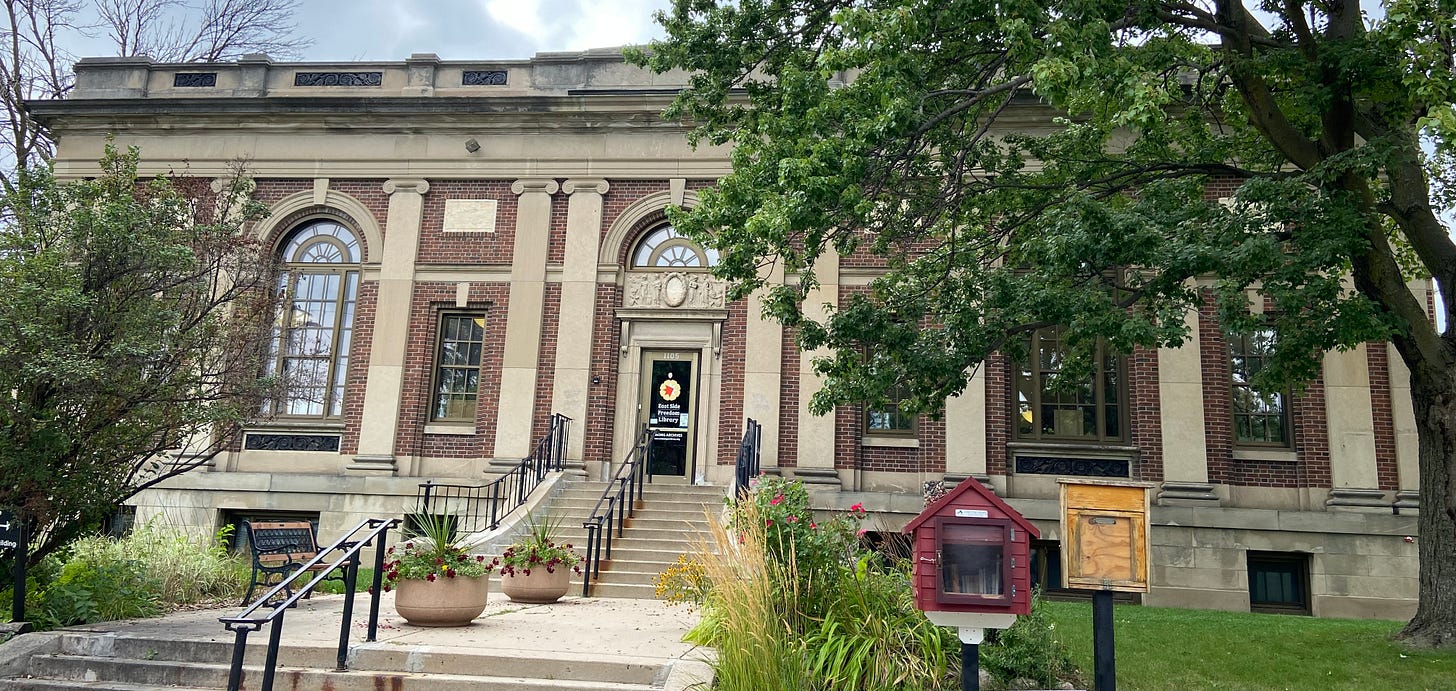The Freedom Library
I visited the East Side Freedom Library yesterday afternoon. It's in a Saint Paul neighborhood and I believe it’s in what was once the Arlington Hills Library, one of Saint Paul’s three Carnegie Libraries (Minneapolis had four). I had visited it a few years ago when I was researching the timber strike that happened around 1918 in the vicinity of Virginia Minnesota (which was the site of what at the time may have been the biggest lumber mill in America -- or at least in the region), following a much larger action by miners on the Iron Range in 1917. That one had been led by the Industrial Workers of the World (IWW or "Wobblies"), so I was curious whether the international union had been involved in trying to organize the winter lumber camps. As it turned out, some people who had been part of the miners strike did speak to lumber crews and try to bring them into solidarity. This wasn't difficult, since many were from the same communities and often from the same immigrant families. There was a very large Scandinavian presence in the woods and the mines, and the Finns were notorious anarchists and Wobblies. So I did find some interesting background that improved my understanding of what was going on in the north woods.
The Library is much the same as I remember it, although unfortunately it seems to be a bit less robust. It's open for a few hours in the afternoon, Tuesday through Thursday, and Mondays by appointment. When I visited there were a couple of researchers working, one of whom let me in. The community seems to be a bit smaller than it was when I visited a few years ago, which may be due to the fact that the people who for whom it had been a labor of love are getting quite old. This is unfortunate, because the collection is just incredible. The collection is based on the personal libraries of several scholars of labor, political radicalism, dissent, anarchism, free speech, socialism, civil rights, and all kinds of adjacent traditions and struggles. I did a quick search on Albert and Lucy Parsons, about who I wrote recently. The results were voluminous and I have to imagine represent some of the best information I could ask for about these subjects. And the books shelved next to the ones I went to the stacks to find...well, let's just say I could spend weeks just poking around the 10-foot-high shelves, running up and down the ladder and making discoveries.
The books in the collections don't circulate, so I'll be visiting as frequently as I can, to gather info and primary sources for my courses. This semester I'm teaching not only US History 2, but African American History and Women in American History. Lucy Parsons, the widow of Albert who was executed for the Haymarket incident, fits into all those courses. She was born a slave in Virginia in 1851 and married Albert in Waco Texas just before they moved to Chicago. After his judicial murder she became an author, editor, and publisher. And she was one of the co-founders of the Industrial Workers of the World! The IWW I had originally visited the Freedom Library to research!
I'll definitely be introducing Lucy and her writing to my students this semester. And I’ll be asking my college library to get me copies of books I find there. And books and articles references in content I find there. And I might even buy a few books. For example, I couldn’t check out this recent biography of Lucy Parsons, but I did manage to get it on Audible. Quite interesting so far!




